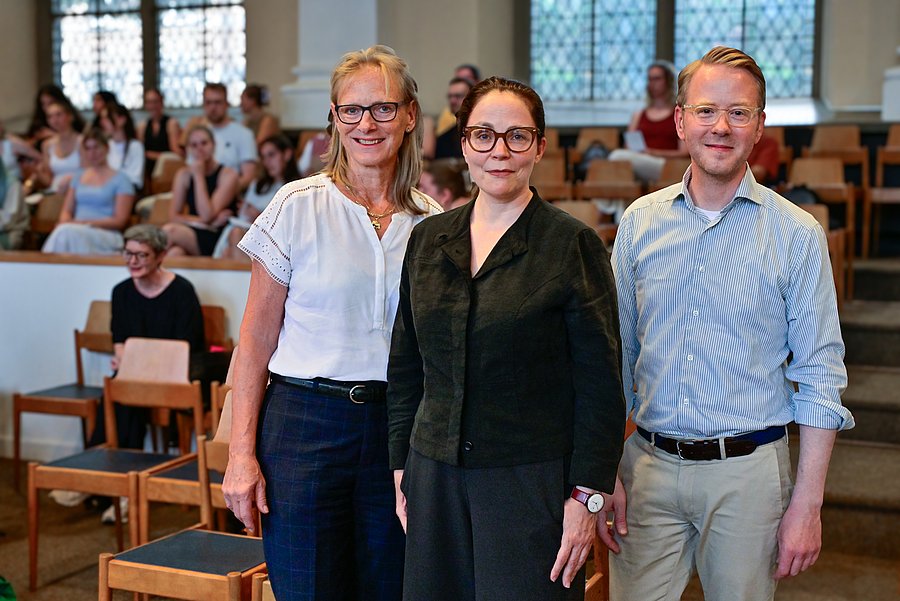Poetics Lectureship 2025
Reading and discussion with Thea Dorn: "It only grabs me when something irritates me"

University Rector Birgitta Wolff (left) and the initiator of the Poetry Lectureship Christian Klein (right) welcomed author Thea Dorn (centre) to the start of her three-part series of events in Wuppertal // Photo Michael Mutzberg
In his introduction, Prof. Christian Klein, initiator of the Poetics Lectureship at the Centre for Narrative Research at the University of Wuppertal, emphasised: "In the current times, it is more necessary than ever to deal with the possibilities and limits of narrative forms with which we describe reality and to be aware of their relevance, as facts, it seems, have now become a bargaining chip."
In her welcoming address, University Rector Birgitta Wolff emphasised how well the Poetics Lectureship for Factual Narrative (see info box), which is unique in Germany, fits in at the University of Wuppertal: the aim of science is to constructively shape reality with well-founded findings and contributions to solutions for challenges and thus also to improve it to a certain extent. "We don't reach everyone by communicating with statistics and footnotes; every year we learn from the Poetics Lectureship what other ways there are to report on reality," said Wolff.
After the welcoming speech, Christian Klein personally introduced Thea Dorn, who holds this year's Poetics Lectureship. The writer stands for lively discussions and productive debate: "As her activities prove, it is not the desire for harmony that guides her in her selection," Klein said, referring to the functions of the graduate philosopher and dramaturge as a TV presenter for "Das literarische Quartett" and as co-spokesperson for the authors' association PEN Berlin.
Encouraging dialogue
According to Klein, Dorn's aim is to "expect something from her readers and not soften the public discourse". The author confirmed this in our conversation: "The most important thing is that we talk to each other, and literature should encourage that." As an author, she does not provide a moral compass in her novels. "You have to be able to endure the feelings that arise in a story where it's not always easy to make sense of things while reading and work them out with yourself and in discussion. It's not me as the author who dictates right or wrong." That, in turn, is what she herself expects from a good book: "It only grabs me when something irritates me and when I first revolt against something and start to think about it."
It is precisely such food for thought that she wants to provide with her writing, in the best sense of a literature that promotes democracy, that holds up a mirror to society and encourages dialogue and reflection on reality. Thea Dorn does this not only in the form of novels. When it comes to topics and questions to which she finds clear answers for herself, the author likes to turn to essays and non-fiction texts.
The poetry lecturer will be discussing this genre and its function in the context of reality narratives in more detail in two further events at the university. Her lectures will take place on Thursday evenings on 3 and 10 July as part of the Poetics Lectureship at the University of Wuppertal on the Grifflenberg campus in lecture hall 14. Admission is free of charge. The lecture starts at 6 pm.
Encounters with renowned authors
Narrative is a fundamental form of our access to reality. In the most diverse areas of everyday life and not least in the fields of scientific knowledge, we orientate and communicate with the help of narratives. Investigative journalism reports, politicians' self-portrayals during election campaigns, reports on experiences in internet blogs, anamneses in medical patient consultations, pleadings in court, economic forecasts of share price developments - all of these communications take place essentially in narrative form. The Wuppertal Poetics Lectureship is the first poetry lectureship in the German-speaking world to focus on the special features of non-literary or factual narration. As part of the lectureship, students spend a semester examining individual writers and the particularities and challenges of reality narratives. The highlight is the personal dialogue with the respective authors.
The event format celebrated its premiere in the summer semester of 2022 with Marcel Beyer as one of the most important and productive contemporary authors in the German-speaking world. In the years that followed, no less prominent representatives were guests at the University of Wuppertal, including the publicist Carolin Emcke and the literary and social scientist Jan Philipp Reemtsma.
Further information on content and dates can be found on the Poetics Lectureship website.
